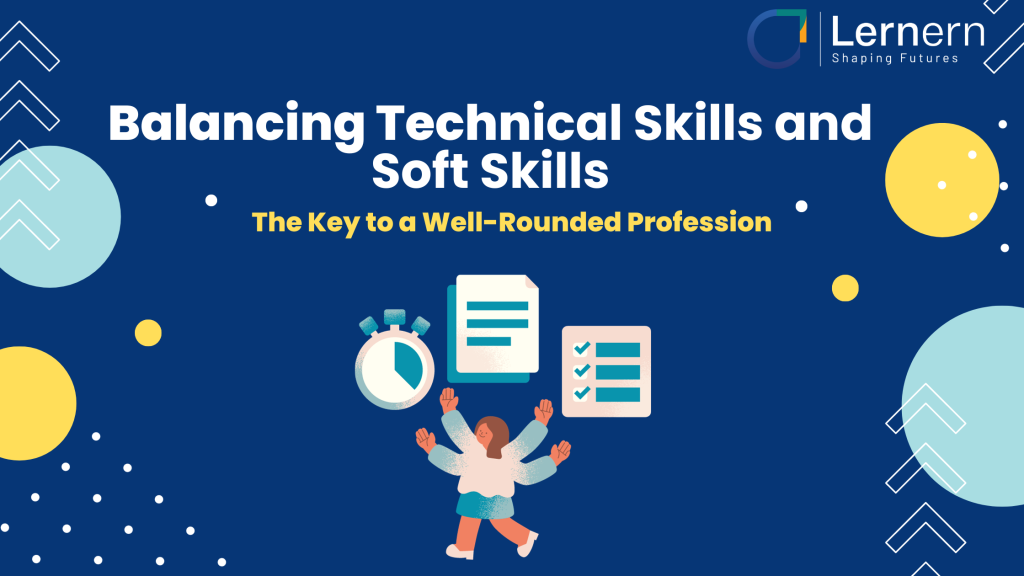Balancing Technical Skills and Soft Skills: The Key to a Well-Rounded Profession

In the swiftly changing landscape of today’s job market, there is an unprecedented need for versatile professionals. Employers are in search of individuals who not only showcase technical prowess for success in their positions but also exhibit interpersonal abilities to flourish in a collaborative and dynamic setting.
Striking this careful equilibrium between technical expertise and soft skills distinguishes outstanding professionals and charts a course for a prosperous and satisfying career.
Understanding Technical Skills
Technical skills encompass distinct capabilities and knowledge essential for carrying out tasks within a specific field or industry. For example, within the IT sector, technical skills encompass proficiency in programming languages, data analysis, and web development. Conversely, technical skills in healthcare might encompass expertise in medical procedures, diagnostics, or patient care.
These skills are crucial as they form the foundation of an individual’s expertise in their chosen domain. They are typically tangible and easily measurable, allowing employers to gauge the proficiency of a potential candidate.
The Significance Of Soft Skills
In contrast, soft skills pertain to personal attributes, character traits, and communication abilities that empower individuals to interact effectively with others. Soft skills encompass areas such as communication, emotional intelligence, adaptability, problem-solving, teamwork, and leadership.
Unlike technical skills, quantifying these skills is more challenging, yet they play a pivotal role in shaping an individual’s professional success. These skills equip professionals to navigate complex situations, forge robust relationships, and lead teams with empathy and resilience.
Navigating the Equilibrium between Technical and Soft Skills
While technical skills showcase a professional’s qualifications, it is the balance with soft skills that truly distinguishes them in the workplace. Imagine a highly skilled software developer who struggles to collaborate with colleagues or communicate complex ideas effectively. Such a scenario might lead to project delays, misunderstandings, and a less productive work environment.
Similarly, a charismatic and empathetic team leader lacking the necessary technical expertise might find it challenging to guide the team effectively and make informed decisions.
Striking the Right Balance between Soft and Technical Skills
- Assessing Your Skill Set: Initiate the process by thoroughly examining your current skill set, encompassing both technical prowess and soft skills. It is imperative to be candid and self-aware, acknowledging areas that warrant improvement. This introspective analysis serves as the foundation for targeted skill development.
- Identifying Priorities: Tailor your skill development strategy to align with your career goals and ambitions. Evaluate the technical and soft skills that hold the utmost relevance and significance in attaining your desired role. By doing so, you establish a roadmap for skill acquisition that directly contributes to your professional aspirations.
- Investing in Continuous Learning: Sustain your professional growth by staying abreast of the latest trends and advancements within your field of expertise. Actively seek opportunities for training and professional development to perpetually augment your technical skills. This commitment to continuous learning ensures that your skill set remains not only current but also positioned to meet the evolving demands of your industry. Embrace a proactive stance, engaging in a dynamic process of skill enhancement that mirrors the progressive nature of your professional landscape.
- Practise Active Communication: Communication is at the core of many soft skills. Practise active listening, clear expression, and non-verbal cues to strengthen your communication abilities.
- Embrace Feedback: Accept constructive criticism with an open mind and a willingness to learn and grow. Feedback can help you identify areas where you need to improve both technically and personally.
- Seek Collaboration Opportunities: Engage in group projects, workshops, or team-building exercises to improve your teamwork and collaboration skills.
Benefits of a Well-Rounded Professional
A well-rounded professional who effectively balances both these skills stands to gain numerous benefits:
- Enhanced Problem-Solving: A combination of technical expertise and critical thinking abilities allows professionals to tackle challenges with a broader perspective and find innovative solutions.
- Effective Leadership: Soft skills like empathy, emotional intelligence, and communication are vital for inspiring and guiding teams toward success.
- Adaptability and Resilience: In today’s dynamic work environment, the ability to adapt to change and bounce back from setbacks is crucial, making a professional more valuable to any organization.
- Increased Job Opportunities: Well-rounded professionals are sought after by employers across various industries, giving them a competitive advantage in the job market.
Maintaining a harmonious blend of technical and soft skills is crucial to becoming a versatile professional capable of excelling in a career and contributing positively to the workplace. Ongoing improvement in both domains will elevate your competencies, positioning you as a valuable asset to any organization. Aim for the optimal balance, as it serves as the cornerstone for unlocking a successful and gratifying professional journey.
Leave a Reply